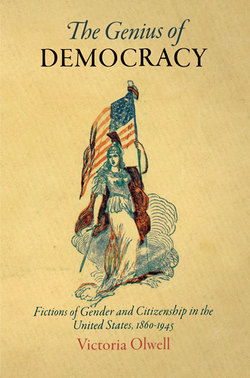The Genius of Democracy

Реклама. ООО «ЛитРес», ИНН: 7719571260.
Оглавление
Victoria Olwell. The Genius of Democracy
Отрывок из книги
The Genius of Democracy
Fictions of Gender and Citizenship in the United States, 1860–1945
.....
Genius figured in just such a miracle. For some theorists, it still does. In a recent essay on “feminine genius,” Julia Kristeva rhetorically asks, “Is not genius precisely the breakthrough that consists in going beyond the situation?”50 When Kristeva frames this question, she means to describe what she terms “feminine genius” to be an actually existing conceptual resource, a kind of unique individual force of creativity defined by a feminine psychosexual particularity (“FG,” 499–501).51 (Interestingly, Hannah Arendt is one of her exemplars of feminine genius.) Kristeva sees current debates over women’s modern social status to be stuck in “the question of their equality or their difference with regard to men,” the very binary that plagued early twentieth-century suffrage advocacy (“FG,” 503). Feminist theory, she contends, totalizes women’s condition, concerning itself “only with the conditions” of “womankind as a whole” to the “neglect of the importance of the subject” (“FG,” 496). Kristeva sees “feminine genius” to include both a feminine particularity, not limited to biological or socially recognized women but realized in a psychoanalytically intelligible feminine sexuality, and a unique individual creativity irreducible to the social conditions that surround it and therefore capable of opposing them. As she writes, modern freedom becomes possible “through the risks that each of us is prepared to take by calling into question thought, language, one’s own age, and any identity that resides in them. You are a genius to the extent that you are able to challenge the sociohistorical conditions of your identity” (“FG,” 504).
It would be possible to read assertions of women’s genius in the fiction and print culture of the nineteenth- and twentieth-century United States through Kristeva’s conception, linking them to expressly psychosexual creativity. But that is not what I am attempting here. While Kristeva approaches “feminine genius” as an actually existing resource for social transformation and the production of democratic freedom, I am interested instead in how and why the idea of female genius became associated, historically and conceptually, with social transformation and democratic emancipation. Indeed, from my perspective, Kristeva’s formulation, for all of its theoretical sophistication and complex grounding in the lives of extraordinary twentieth-century women, looks like a modern extension of the historical discourse I want to uncover. In the late nineteenth and early twentieth centuries, narratives of female genius developed the idea that genius possessed world-transforming capacities and that these served feminist and activist purposes.
.....